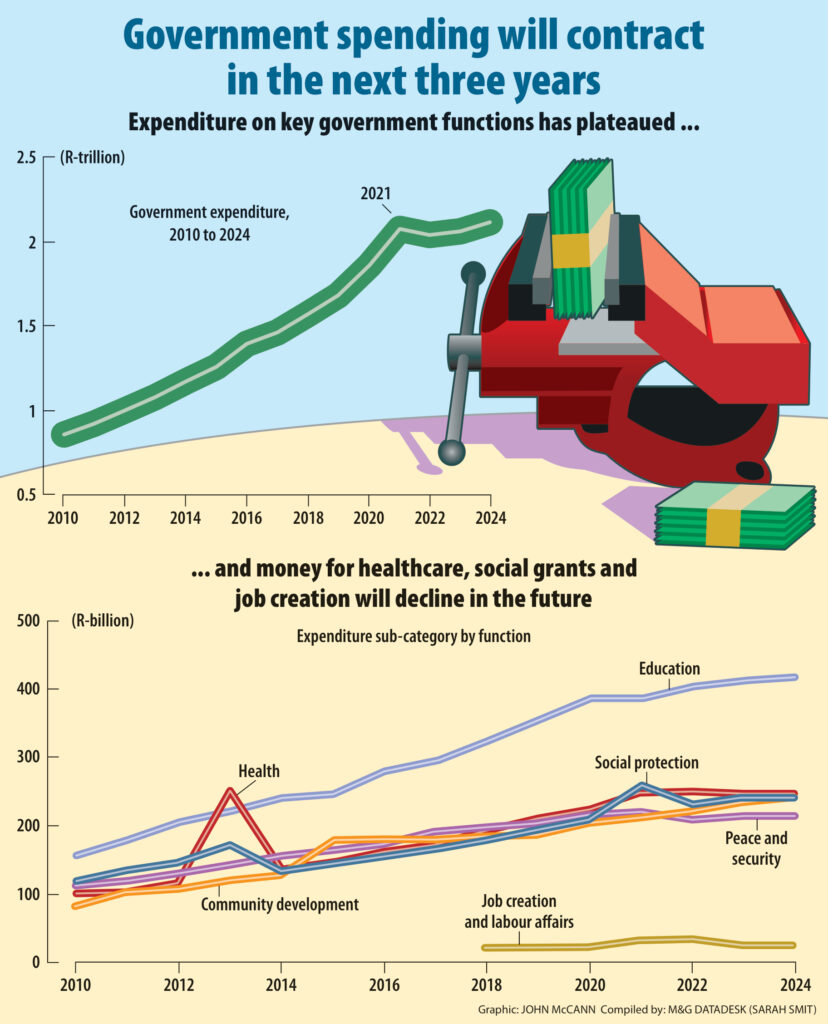Having faith that market forces alone will create full employment under an enabling environment is a pipe dream. A wage subsidy programme is a good place to start tackling joblessness. (Oupa Nkosi)
Government spending on critical functions such as healthcare has plateaued over the past decade. And the country can expect more cuts. The Mail & Guardian’s review of government spending from 2011 to 2020 and found that, although more money was doled out each year, generally the budgets for important functions had stagnated.
Notably, spending on healthcare is still below what it was in 2013, the year experts agree was the last before the country was thrust into austerity.
The health budget for the next three years will remain lower than it was in 2013.
According to the 2021 budget, released by the treasury last week, real main budget noninterest expenditure is projected to contract each year over the next three years. As a gross domestic product (GDP)share, noninterest expenditure will moderate from 29.2% in 2021-22 to 26.2% by 2023-24.
The budget marks the first cuts to nominal noninterest government expenditure in at least 20 years.
Healthcare, social protection and job creation will all experience cuts in the medium term.
Expenditure on health will decline from R247-billion in 2020-21 to R245-billion in 2023-24. The social grants budget will be reduced by R5.8-billion in 2021-22, R10.7-billion in 2022-23 and R19.5-billion in 2023-24.
Despite the country being in the throes of an enduring unemployment crisis, money allocated to job creation will reduce by 27% from R33-billion in 2022 to R24-billion in 2024. Spending on job creation grew by only 5% between 2018 and 2020.
A big target for Finance Minister Tito Mboweni’s budget cuts is the public sector wage bill, which will be reduced by R303.4-billion in the 2020-21 and 2023-24 financial years. As a result, health workers and teachers will face compensation freezes and early retirement.
In his budget speech, Mboweni emphasised fiscal consolidation. “Continuing on the path of fiscal consolidation during the economic fallout was a difficult decision. However, in this, we are resolute. We remain adamant that fiscal prudence is the best way forward. We cannot allow our economy to have feet of clay.”
But he was later also at pains to deny claims that the 2021 budget reflects the government’s austerity programme.
“When people talk austerity, I don’t know what they are talking about,” Mboweni said during a post-budget briefing of parliament’s standing committee on finance.
“If, for example, 56% of the budget is for social services … anyway, it is in the nature of politics. People have to be seen to be saying something.”
 (John McCann/M&G)
(John McCann/M&G)
Critics disagree
The Institute of Economic Justice (IEJ) said in a statement that the budget “reinforces treasury’s extreme approach to fiscal consolidation. This entails a fall in spending per person and leads to real reductions in health, learning and culture, and general public services. Giving the pressing social needs, enormously exacerbated by Covid-19, this is deeply irresponsible.”
The IEJ statement said the fiscal consolidation programme set out in the budget is “economic suicide”.
IEJ economist and researcher Busi Sibeko told the M&G that the budget represents austerity “by its definition”.
“There are cuts across the board — massive cuts — to things we need.”
Sibeko pointed out that if the child support grant, which has the highest nominal increase (3.4%) in 2020-2021 and 2021-2022, is compared with inflation it will be a decline of 0.83%.
“Women carry more of the burden of social provisioning and therefore require more access to public services, which austerity takes away. So women are disproportionately impacted by austerity,” said Sibeko.
On the negative effect of austerity, Sibeko said: “Government spending makes up 30% of our GDP. So what happens if you contract GDP? Then the debt to GDP ratio will increase unless there is growth. And this entire plan hinges on the idea that the private sector will come to the table and increase our GDP. But the private sector is also shrinking during this crisis.”
Sibeko is also the co-chair of the Budget Justice Coalition, which made its submission on the budget to the standing committee on finance this week. The submission notes that in 2022-23, the government will be spending R2 700 less per person on public services than it did in 2019-20.
Economist Duma Gqubule said the treasury has historically overestimated the effect of structural reforms on GDP growth but underestimated the effect of austerity. When compared with previous “austerity lite” years the 2021 budget is more severe.
“There is no doubt that this is austerity. Every single page of the budget I am reading now talks of fiscal consolidation,” he said. “Everywhere in red ink, they are cutting. So it is an austerity budget. The minister must tell the truth.”